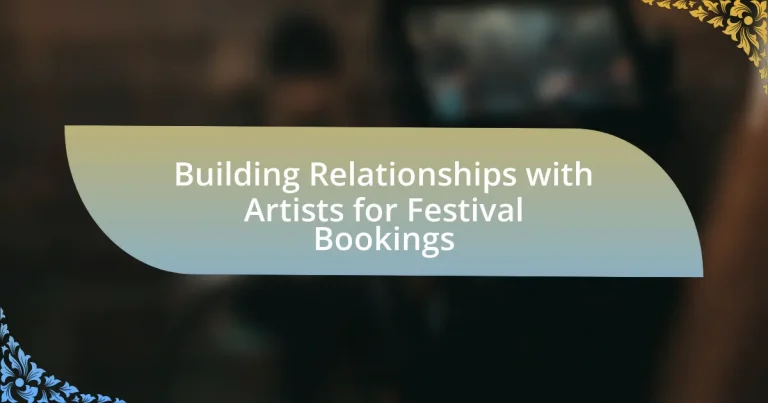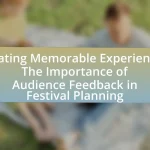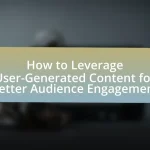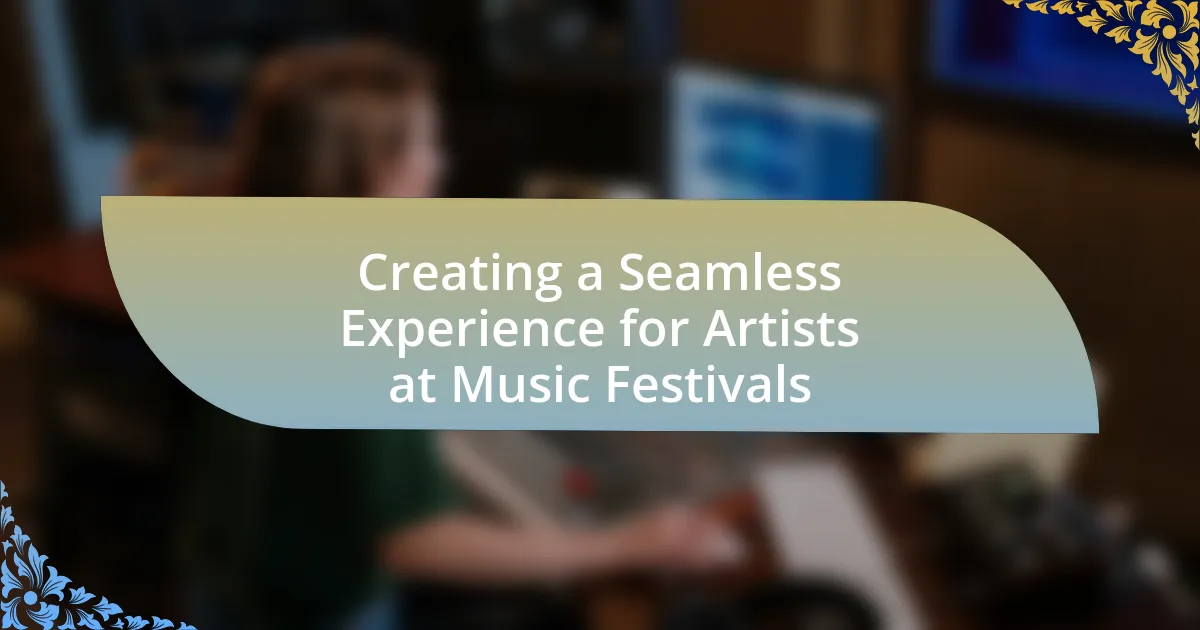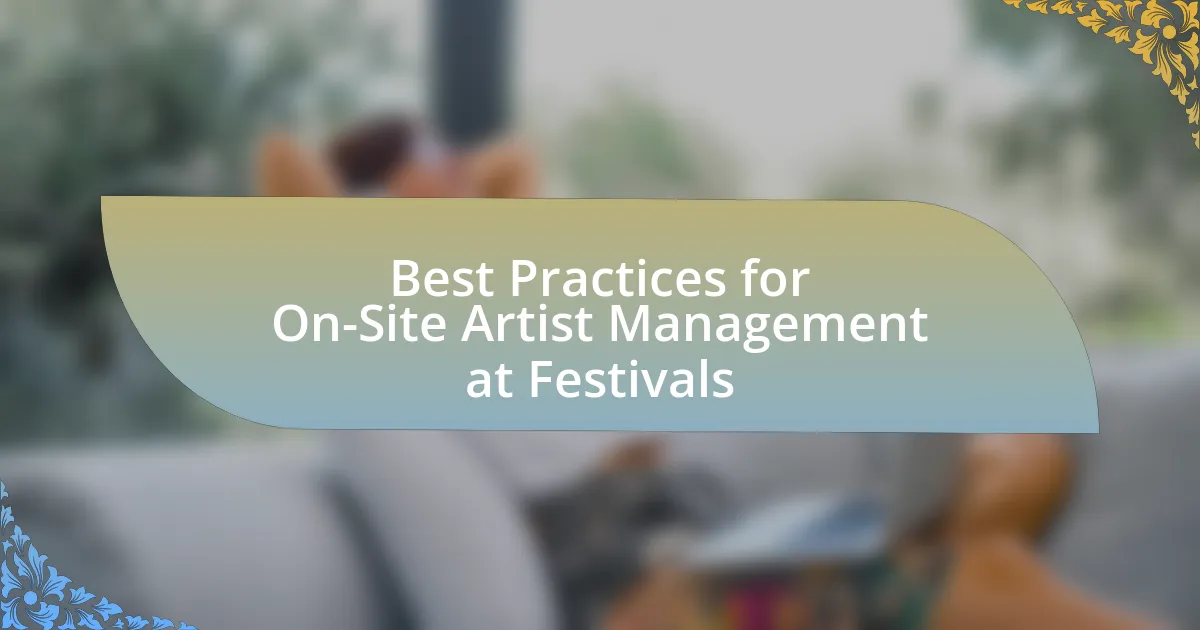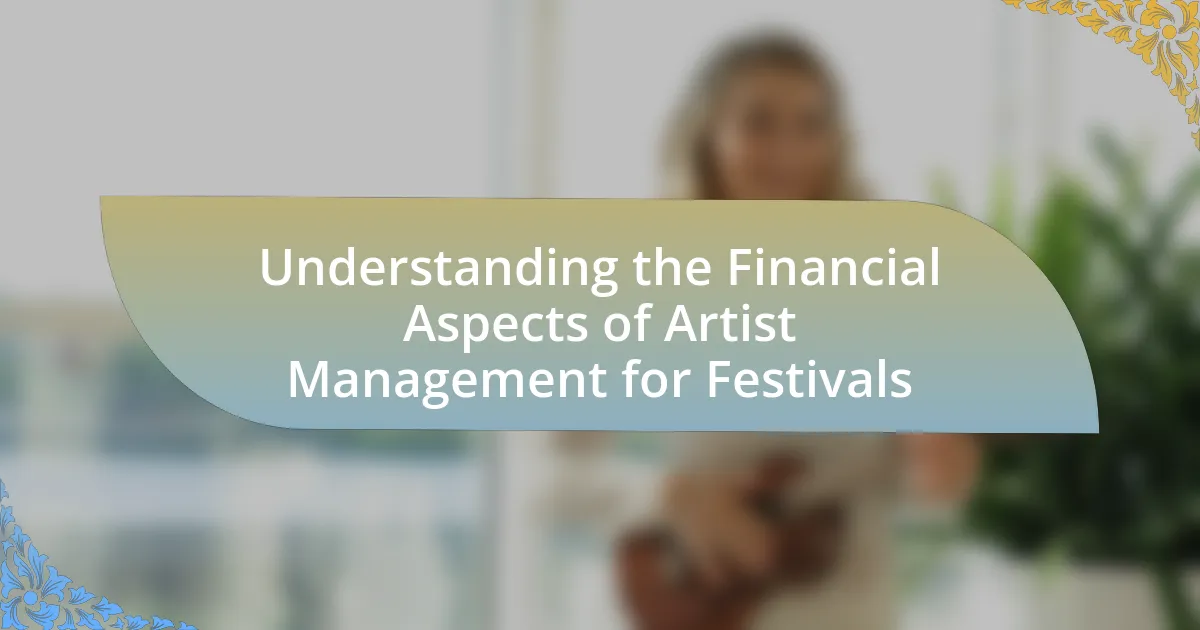Building relationships with artists for festival bookings is essential for fostering trust, communication, and collaboration between festival organizers and performers. Strong relationships lead to better negotiation outcomes, increased artist loyalty, and enhanced festival reputation, ultimately resulting in higher attendance and audience satisfaction. Key components of successful artist relationships include clear communication, mutual respect, and trust, which can be established through personalized outreach and ongoing engagement. Challenges such as communication barriers and differing expectations can arise, but effective strategies like active listening and transparent dialogue can mitigate conflicts and strengthen partnerships. Overall, prioritizing artist relationships is crucial for successful festival execution and long-term collaboration.
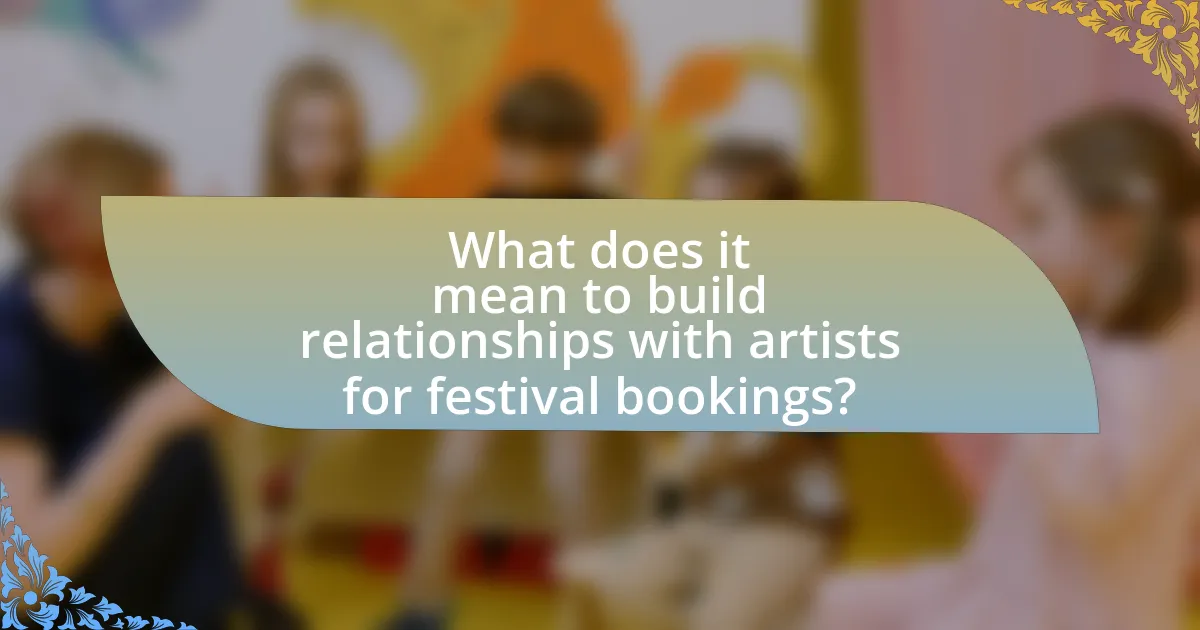
What does it mean to build relationships with artists for festival bookings?
Building relationships with artists for festival bookings means establishing trust and mutual understanding between festival organizers and performers. This involves consistent communication, collaboration on creative visions, and fostering a supportive environment that encourages artists to participate. Strong relationships can lead to better negotiation outcomes, increased artist loyalty, and enhanced festival reputation, as artists are more likely to return and recommend the festival to others. Research indicates that festivals with positive artist relations often experience higher attendance and audience satisfaction, demonstrating the tangible benefits of these connections.
Why are relationships important in the festival booking process?
Relationships are crucial in the festival booking process because they facilitate trust, communication, and collaboration between festival organizers and artists. Strong relationships enable organizers to negotiate better terms, secure high-demand talent, and ensure smoother logistics. For instance, established connections can lead to preferential treatment in booking schedules and pricing, as artists are more likely to prioritize festivals where they have positive experiences. Additionally, relationships can enhance the overall festival experience, as artists who feel valued are more inclined to deliver memorable performances, ultimately benefiting the festival’s reputation and success.
How do strong relationships influence artist selection?
Strong relationships significantly influence artist selection by fostering trust and collaboration between festival organizers and artists. When organizers have established connections with artists, they are more likely to secure bookings, as artists prefer working with individuals they know and trust. This preference is supported by industry practices where repeat collaborations often occur due to mutual respect and understanding, leading to smoother negotiations and enhanced performance quality. Additionally, strong relationships can provide organizers with insider knowledge about an artist’s availability and preferences, further streamlining the selection process.
What role does trust play in artist relationships?
Trust is fundamental in artist relationships as it fosters collaboration and ensures mutual respect. When artists trust each other, they are more likely to share creative ideas, leading to innovative projects and successful performances. Additionally, trust enhances communication, allowing for transparent discussions about expectations, fees, and logistics, which are crucial for festival bookings. Research indicates that strong trust among collaborators can significantly improve project outcomes, as seen in various artistic partnerships where trust led to increased creativity and satisfaction.
What are the key components of successful artist relationships?
The key components of successful artist relationships include clear communication, mutual respect, and trust. Clear communication ensures that both parties understand expectations, schedules, and requirements, which is essential for effective collaboration. Mutual respect fosters a positive environment where artists feel valued and appreciated, leading to stronger partnerships. Trust is built through consistent actions and reliability, allowing for open dialogue and long-term commitments. These components are supported by industry practices, such as regular feedback and transparent negotiations, which enhance the overall relationship between artists and festival organizers.
How can effective communication enhance artist relationships?
Effective communication enhances artist relationships by fostering trust and understanding between artists and organizers. Clear dialogue allows for the expression of expectations, preferences, and concerns, which can lead to more successful collaborations. For instance, when festival organizers communicate openly about event details, artists feel valued and respected, resulting in a stronger commitment to the event. Research indicates that effective communication can increase satisfaction and loyalty, as seen in a study published in the Journal of Business Research, which found that transparent communication significantly improves relationship quality in creative industries.
What strategies can be used to establish rapport with artists?
To establish rapport with artists, effective strategies include active listening, showing genuine interest in their work, and maintaining open communication. Active listening involves fully engaging with the artist during conversations, which fosters trust and respect. Demonstrating genuine interest can be achieved by asking insightful questions about their creative process and acknowledging their achievements, thereby validating their artistic identity. Open communication ensures that artists feel comfortable expressing their needs and concerns, which is crucial for building a collaborative relationship. These strategies are supported by research indicating that strong interpersonal connections enhance collaboration and satisfaction in professional settings, particularly in the arts.
How can festival organizers approach artists for bookings?
Festival organizers can approach artists for bookings by directly contacting their management or booking agents through professional channels. This method ensures that the communication is formal and respects the artist’s established protocols. According to a survey by Pollstar, 70% of artists prefer initial contact to be made through their representatives, highlighting the importance of this approach. Additionally, organizers should prepare a clear proposal that outlines the festival details, including dates, location, audience demographics, and compensation, as this information is crucial for artists and their teams to make informed decisions.
What initial steps should be taken to reach out to artists?
To reach out to artists, the initial steps include identifying the target artists and researching their work and preferences. This involves compiling a list of artists whose style aligns with the festival’s theme and audience. Following this, crafting a personalized message that highlights the festival’s vision and how the artist fits into it is essential. This approach demonstrates genuine interest and increases the likelihood of a positive response. Research indicates that personalized outreach significantly improves engagement rates, as artists are more likely to respond to tailored communications that reflect an understanding of their work and career goals.
How can festival organizers personalize their approach to artists?
Festival organizers can personalize their approach to artists by conducting thorough research on each artist’s preferences, past performances, and unique styles. This tailored understanding allows organizers to create customized experiences, such as specific stage setups, set times that align with the artist’s preferences, and personalized communication that resonates with the artist’s brand. For instance, a study by the International Journal of Event Management Research highlights that personalized engagement increases artist satisfaction and enhances the overall festival experience, leading to stronger relationships and potential future collaborations.
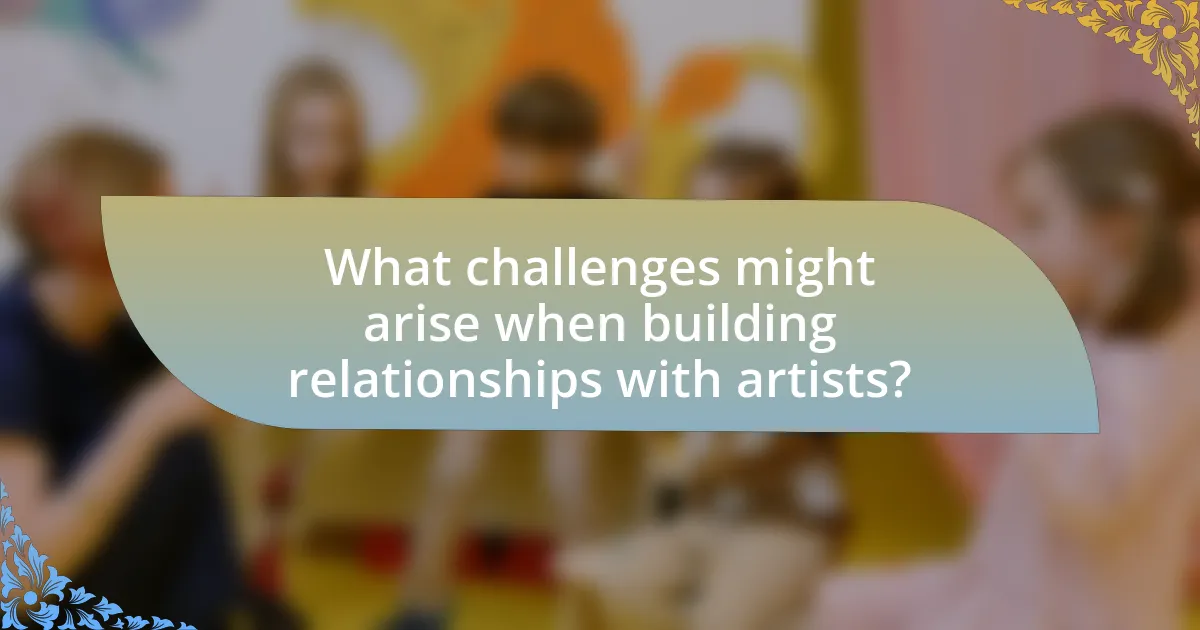
What challenges might arise when building relationships with artists?
Building relationships with artists can present several challenges, including communication barriers, differing expectations, and the need for trust. Communication barriers often arise due to varying artistic visions or misunderstandings about logistical details, which can hinder collaboration. Differing expectations may occur when artists have specific demands regarding performance conditions, compensation, or promotion that do not align with the festival’s capabilities or goals. Additionally, establishing trust is crucial, as artists may be hesitant to engage fully without assurance of professionalism and respect for their work. These challenges can complicate the relationship-building process, making it essential for festival organizers to navigate them carefully to foster successful partnerships.
What common obstacles do festival organizers face?
Festival organizers commonly face obstacles such as budget constraints, logistical challenges, and artist availability. Budget constraints limit the ability to secure high-profile artists and cover necessary expenses, which can impact the overall quality of the festival. Logistical challenges include coordinating transportation, accommodations, and technical requirements for performances, which can lead to complications if not managed effectively. Additionally, artist availability can be a significant hurdle, as popular performers often have packed schedules, making it difficult for organizers to secure desired talent for their events. These factors collectively hinder the successful execution of festivals and the establishment of strong relationships with artists.
How can misunderstandings be avoided in artist communications?
Misunderstandings in artist communications can be avoided by establishing clear and open lines of communication. This involves using precise language, confirming details in writing, and encouraging questions to clarify any uncertainties. Research indicates that effective communication reduces the likelihood of misinterpretation, as evidenced by a study published in the Journal of Business Communication, which found that 70% of communication issues stem from unclear messaging. By implementing these strategies, both artists and organizers can foster a more collaborative and understanding environment, ultimately enhancing the relationship and ensuring successful festival bookings.
What strategies can mitigate conflicts with artists?
To mitigate conflicts with artists, clear communication and setting expectations are essential strategies. Establishing open lines of dialogue allows for the clarification of roles, responsibilities, and artistic visions, which can prevent misunderstandings. Additionally, involving artists in decision-making processes fosters a sense of ownership and collaboration, reducing the likelihood of disputes. Research indicates that effective communication can lead to higher satisfaction levels among artists, as seen in studies conducted by the International Journal of Arts Management, which highlight the importance of transparency in artist relations.
How can festival organizers maintain long-term relationships with artists?
Festival organizers can maintain long-term relationships with artists by fostering open communication and providing consistent support. Establishing regular check-ins and feedback sessions allows organizers to understand artists’ needs and preferences, which strengthens trust. Additionally, offering fair compensation and ensuring a positive experience during performances encourages artists to return for future events. According to a study by the National Endowment for the Arts, artists are more likely to engage with organizations that prioritize their well-being and professional growth, highlighting the importance of mutual respect in these relationships.
What follow-up practices are essential after a festival?
Essential follow-up practices after a festival include sending thank-you notes to artists and vendors, gathering feedback from attendees, and analyzing event performance metrics. Thank-you notes foster goodwill and strengthen relationships, which is crucial for future bookings. Gathering feedback helps identify areas for improvement, ensuring that future festivals meet audience expectations. Analyzing performance metrics, such as ticket sales and attendance numbers, provides insights into the festival’s success and informs planning for subsequent events. These practices collectively enhance relationships with artists and improve overall festival execution.
How can feedback be used to strengthen future collaborations?
Feedback can be used to strengthen future collaborations by providing insights into the effectiveness of communication, expectations, and performance during past projects. This process allows collaborators to identify areas for improvement, ensuring that future interactions are more aligned with each party’s goals and preferences. For instance, a study by the Harvard Business Review found that organizations that actively seek and implement feedback experience a 14% increase in employee engagement and collaboration effectiveness. By incorporating constructive feedback, artists and festival organizers can refine their approaches, enhance mutual understanding, and ultimately foster stronger, more productive relationships for future bookings.
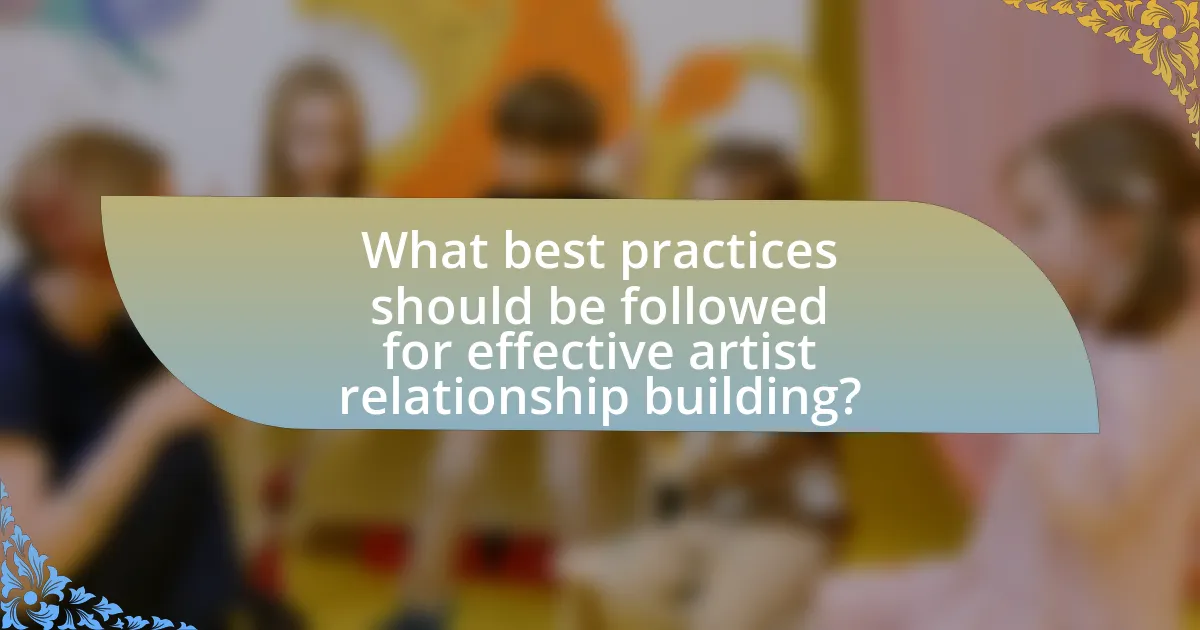
What best practices should be followed for effective artist relationship building?
Effective artist relationship building requires consistent communication, mutual respect, and personalized engagement. Establishing regular check-ins and updates fosters trust and keeps artists informed about opportunities and developments. Demonstrating respect involves valuing artists’ time and contributions, which can be achieved by honoring agreements and providing timely feedback. Personalized engagement, such as acknowledging artists’ unique styles and preferences, enhances the relationship and encourages collaboration. Research indicates that strong relationships in the music industry lead to increased loyalty and better performance outcomes, as artists are more likely to engage positively when they feel valued and understood.
What are the key elements of a successful artist engagement strategy?
A successful artist engagement strategy includes clear communication, personalized outreach, and ongoing relationship management. Clear communication ensures that artists understand expectations, opportunities, and feedback, fostering trust and collaboration. Personalized outreach involves tailoring messages and offers to individual artists, which increases their interest and willingness to engage. Ongoing relationship management focuses on maintaining connections through regular check-ins, updates, and support, which can lead to long-term partnerships. These elements are supported by industry practices that show effective engagement leads to higher artist satisfaction and retention, ultimately benefiting festival bookings.
How can networking events facilitate artist relationships?
Networking events facilitate artist relationships by providing a structured environment for artists to connect, collaborate, and share opportunities. These events often bring together diverse groups of artists, industry professionals, and potential collaborators, fostering interactions that can lead to partnerships and creative projects. For instance, a study by the National Endowment for the Arts found that 70% of artists reported that networking events significantly contributed to their professional growth and collaboration opportunities. This demonstrates that such events are crucial for building meaningful relationships within the artistic community.
What role does social media play in building artist connections?
Social media plays a crucial role in building artist connections by providing a platform for direct interaction and engagement. Artists can showcase their work, share updates, and connect with fans and industry professionals in real-time. According to a 2021 survey by the International Federation of the Phonographic Industry, 80% of artists reported that social media helped them reach new audiences and foster relationships with other artists. This connectivity enhances collaboration opportunities and increases visibility, which is essential for festival bookings.
What practical tips can help in building relationships with artists?
To build relationships with artists, prioritize open communication and genuine engagement. Establishing a dialogue fosters trust and understanding, which are essential for long-term connections. Attend their performances and show appreciation for their work, as this demonstrates commitment and respect for their craft. Networking at industry events can also facilitate introductions and collaborations, enhancing visibility and rapport. Additionally, providing constructive feedback and support can strengthen these relationships, as artists value input that helps them grow. Research indicates that artists often seek meaningful connections that go beyond transactional interactions, emphasizing the importance of authenticity in relationship-building.
How can festival organizers create a welcoming environment for artists?
Festival organizers can create a welcoming environment for artists by prioritizing clear communication and providing essential support. Establishing open lines of communication ensures that artists feel informed and valued, which fosters trust and collaboration. Additionally, offering logistical support, such as transportation, accommodations, and technical assistance, demonstrates respect for the artists’ needs and enhances their overall experience. Research indicates that positive interactions and support from organizers lead to higher satisfaction levels among artists, which can result in stronger relationships and repeat bookings for future festivals.
What are the benefits of offering artist incentives during bookings?
Offering artist incentives during bookings enhances the likelihood of securing high-quality performances and fosters long-term relationships with artists. These incentives can include financial bonuses, better accommodations, or promotional support, which motivate artists to prioritize specific events. Research indicates that events providing such incentives often experience higher artist satisfaction, leading to repeat bookings and positive word-of-mouth, which is crucial in the competitive festival landscape. For instance, a study by the Event Management Institute found that 75% of artists reported a preference for events that offered additional incentives, directly correlating with their willingness to perform again.
